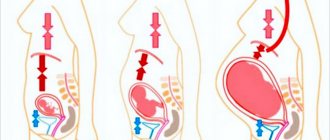Bitterness in the mouth may indicate problems with the digestive system. Severe or persistent bitterness in the mouth is a reason to consult a doctor.
From time to time you may experience an unpleasant bitter taste in your mouth. As a rule, this is due to a sudden release of bile into the gastrointestinal tract. In this case, some bile may enter the esophagus and cause a bitter sensation in the mouth.
. Often a bitter taste in the mouth is felt in the morning, since bile can enter the stomach during sleep (especially if you sleep on your left side and dinner included fatty foods).
Bile is a secretion produced by the liver and is necessary for digesting food. The bile duct carries bile from the liver to the gallbladder, which acts as a storage reservoir. During the active digestive phase, bile from the gallbladder enters the duodenum. Some substances have choleretic properties, that is, they increase the production of bile. Eating foods with choleretic properties (for example, pine nuts) can provoke a sharp increase in the flow of bile into the intestines and, as a result, the appearance of bitterness in the mouth. Some medications have the same effect - both medical preparations and traditional medicine (St. John's wort, sea buckthorn oil, etc.).
However, bitterness in the mouth should not be ignored
. Its appearance indicates that not everything is in order with the digestive system. For example, a bitter taste may appear after eating fatty (heavy) foods. Fatty foods stimulate bile secretion. Normally, the secreted bile should not enter the stomach and esophagus, but should be released exactly as much as is necessary for the digestive process in the intestines. The appearance of bitterness indicates that this is not the case. And we need to figure out what caused this. If bitterness in the mouth occurs frequently or persists for a long time, then it is better not to delay a visit to the doctor.
Causes of bitterness in the mouth
Bitterness in the mouth can be a symptom of various diseases.
Most often it is caused by diseases of the organs responsible for the production and movement of bile in the body, such as chronic cholecystitis
(inflammation of the gallbladder),
cholelithiasis
(in this case, the formation of stones interferes with the proper outflow of bile),
biliary dyskinesia
(impaired motility). Sometimes patients who previously had a bitter taste in the mouth due to cholelithiasis or inflammation of the gallbladder, and who had a cholecystectomy (surgery to remove the gallbladder), are surprised by the return of the symptom. But a bitter taste in the mouth can occur even in the absence of a gallbladder, because bile is still produced and can enter the stomach, and from it into the esophagus. If a person has had their gallbladder removed but has not changed their eating habits, the return of digestive problems and a bitter taste in the mouth is very likely
Bitterness in the mouth can occur with various disorders of the digestive system, for example with chronic gastritis
or
chronic pancreatitis
Liver diseases can lead to changes in the composition of saliva, which may also result in a bitter taste in the mouth.
Another group of reasons for the feeling of bitterness in the mouth is diseases of the oral cavity (stomatitis, inflammation of the tongue). A bitter taste can also be a reaction to dentures if they were chosen incorrectly (the individual intolerance of the material from which they are made was not taken into account).
Sometimes bitterness in the mouth is caused by other reasons: toxicosis (in pregnant women), acute poisoning, cancer.
Precautionary measures
To avoid a feeling of bitterness, it is recommended not to lift weights for an hour after eating, avoid intense physical activity, and not wear tight clothes. Since various dental problems can lead to a bitter taste in the mouth, timely treatment of caries, gingivitis and other local diseases will help prevent such discomfort.
As you can see, a bitter taste in the mouth during pregnancy can be a variant of the physiological norm or be a symptom of malfunctions in the digestive tract, as well as a consequence of dental problems. If such discomfort occurs constantly, accompanied by abdominal pain, belching, bad breath, vomiting and nausea, you must consult a doctor for examination and selection of treatment.
Additional symptoms of bitterness in the mouth
Bitterness in the mouth may be accompanied by additional symptoms. If heaviness or pain is felt in the right side, this may indicate liver or gallbladder disease. If bitterness in the mouth is accompanied by nausea, heartburn, and belching, then the cause may be stomach diseases. If the cause is diseases of the oral cavity, then the feeling of bitterness may be accompanied by bad breath.
What causes heartburn during pregnancy?
Heartburn during pregnancy occurs due to hormonal changes.
In general, many different factors can provoke heartburn. If we are talking about a patient who is “pregnant,” the root cause of this disease will most likely be due to the current stage of pregnancy.
However, several general points can be identified that adversely affect the gastrointestinal tract of the expectant mother, regardless of the actual trimester:
- Changes in hormonal levels. Progesterone, actively produced by the body of any pregnant woman, designed to relax the muscles of the uterus and prevent its hypertonicity, similarly acts on the sphincter, which prevents the contents of the stomach from entering the esophagus. The said body ceases to perform its functions properly, which leads to quite predictable consequences. The feeling of heartburn in this case is a completely natural reaction of the nerve endings to the entry of “inappropriate” gastric juice into the esophagus.
- Increased intra-abdominal pressure. In this case, heartburn is also the result of gastric juices entering the esophagus. However, this time the reason for the dysfunction of the sphincters between the organs is their compression. A similar effect occurs in the last trimester of pregnancy as a result of significant enlargement of the uterus.
- Digestive dysfunction. Changing the level of hormones in the body inevitably affects the functioning of all organs of the gastrointestinal tract. In particular, under the influence of progesterone, the acidity of gastric juices can increase, which in itself can cause discomfort in the sternum. In addition, the process of digesting food in the body of a pregnant woman requires much more time than it would take if we were talking about a patient who was not “pregnant.” Thus, by eating the dishes that are familiar to her, the expectant mother almost always dooms herself to an upset stomach, often accompanied by heartburn.
Under the influence of one or more of the factors described above, a pregnant woman may feel a burning sensation and pain behind the sternum or in the esophagus, as well as detect other characteristic signs of the described disease.
In particular, these include sour or bitter belching, excessive salivation, accompanied by a desire to cough, nausea and, finally, bloating. As mentioned above, the manifestation of such symptoms during pregnancy is absolutely normal, although it causes some discomfort.
There will be no particular harm from heartburn either for the expectant mother or for the fetus she is carrying. Therefore, if a woman showed signs of this disease only during pregnancy, she does not necessarily need to visit a doctor about this. She can get rid of the unpleasant symptoms of heartburn on her own.
Treatment of heartburn in the first and second trimesters of pregnancy
If you have heartburn in pregnant women, you need to consume more dairy products.
The main cause of indigestion and, as a consequence, heartburn in early pregnancy is an incorrectly selected diet.
Excessively spicy and fatty foods, an excess of fried foods, and the lack of a basic nutritional schedule will almost certainly lead to a burning sensation in the esophagus, gradually turning into nausea and vomiting syndrome. How to deal with this?
Practice shows that in order to get rid of heartburn that occurs in the first trimester of pregnancy, it is usually enough for the expectant mother to start adhering to some simple rules governing food intake. So, for a woman bearing a fetus it will be useful:
- switch to fractional meals;
- review your diet, choosing lean meat, dairy products and fresh vegetables;
- learn new methods of preparing your favorite, but not very healthy dishes using a double boiler;
- completely give up “harmful things” like carbonated drinks, sweet mineral water or coffee;
- get rid of the habit of washing down food, which is dangerous for the stomach, replacing it with thorough chewing of food.
With the onset of the second trimester of pregnancy, the expectant mother should continue to adhere to these simple rules. Among other things, she will have to forget about overeating. The fact is that, as the baby grows in her womb, a woman may feel the desire to gradually increase the amount of food she eats.
However, this feeling is deceptive and even dangerous. After all, the larger the fetus becomes, the more intrauterine pressure “jumps” and, accordingly, digestion slows down. Of course, all of the above does not mean that a pregnant woman should go on a strict diet and generally limit herself in every possible way in food. An acceptable way out of the situation would be to switch to more frequent meals, but with reduced portions of food.
Treatment of heartburn in the third trimester of pregnancy
In the third trimester of pregnancy, you need to follow a special diet.
In the later stages of pregnancy, heartburn is usually a consequence of an incorrect breech presentation (buttocks down) of the fetus.
This happens if a woman is expecting several children at once, or when the only child turns out to be too large.
In both described cases, the baby’s fully formed head puts pressure on the mother’s diaphragm, causing the latter discomfort in the sternum or even pain.
Unfortunately, it is impossible to completely get rid of this kind of heartburn until the baby is born. But it is quite possible to significantly alleviate attacks of the disease by following the previously discussed diet and basic daily routine.
In addition, there are several additional “secrets”, knowledge of which will help reduce the frequency of heartburn exacerbations to a minimum. The essence of all the methods described below is to, if possible, reduce the pressure on the internal organs of a pregnant woman:
- Shortly before giving birth, a woman should completely update her wardrobe. So, the clothes of the expectant mother should be loose, not restricting movement and not constricting. Correct posture and well-chosen body position during rest and sleep will help reduce the outflow of gastric juice into the esophagus. For example, before getting into bed, a pregnant woman should place several pillows under her head and shoulders to keep her upper body elevated.
- Following a diet is the best prevention of heartburn. Fractional meals in small portions throughout pregnancy are highly likely to help avoid this disease altogether. If it is difficult for the expectant mother to adhere to a strict eating regimen, at least she should still remember one rule - any food less than three hours before going to bed is taboo! The digestive process in pregnant women generally occurs with some complications, so making it even more difficult with an afternoon rest is strictly prohibited!
If the expectant mother feels an urgent need to lie down soon after eating, this must be done in a strictly defined manner. Thus, it is believed that sleeping on the left side with your knees bent and a pillow placed between them does not have such a negative effect on the digestion process as “lying down” rest in any other positions.
Some foods, such as papaya, have a soothing effect on the stomach and therefore can be excellent tools to combat heartburn.
At the same time, other foods, such as baked goods, animal fats, as well as sour fruits and berries, only cause irritation of the mucous membrane of the mentioned organ by stimulating the production of hydrochloric acid, so it is better to completely avoid eating it.
How to get rid of bitter taste?
Bitterness in the mouth during pregnancy, associated with hormonal changes and fetal growth, does not affect the condition of the baby, but can darken the life of the expectant mother. You can completely get rid of the unpleasant symptom only after the birth of the child. There are ways to alleviate a woman’s condition by temporarily reducing bitterness. The use of any methods must be agreed upon with a gynecologist.
Diet and regime
A pregnant woman's diet has a direct impact on the appearance of bitterness. Eating fatty, fried, salty and smoked foods increases the load on the stomach. Digestion of such food occurs more slowly, so the food enters the esophagus, causing a feeling of bitterness and burning. You cannot drink strong tea and coffee, because... they relax the muscles of the gastric valve, and the acid comes out freely. Chocolate, flour products and carbonated drinks should also be excluded from the diet. Healthy foods:
- fresh vegetables and fruits (seasonal);
- berry fruit drinks and juices;
- kefir, cheese, milk.
It is necessary to reduce the size of portions. When you overeat, the stomach stretches, causing the release of acid. It is better to eat small portions 5-6 times a day. This promotes rapid digestion of food.
Physical activity of the expectant mother
Physical activity with normal health and the absence of prohibitions on the part of doctors contributes to the activation of all processes in the body. It is necessary to maintain smooth movements and limit strength exercises.
Pregnant women should not lie down immediately after eating. After eating, it is recommended to walk in the fresh air for 30-60 minutes. Fresh air has a beneficial effect on digestion. You can't eat before bed. In some cases, bed rest is indicated. Then it is necessary to place a pillow under your back so that gastric juice does not enter the esophagus.
Medication approach
Medicines during pregnancy are prescribed only by a specialist. It is forbidden to use the products yourself, increase or decrease the dosage and course of treatment.
Expectant mothers are allowed to take:
- Maalox;
- Gaviscon;
- Almagel.
These drugs normalize the functioning of the gastrointestinal tract and relieve symptoms. They can be used even in the early stages of pregnancy in the absence of contraindications.
Traditional medicine
The use of traditional medicine should be agreed with a gynecologist. Some herbs have a negative effect on the fetus, slowing down its growth and development. Methods for eliminating bitterness in the mouth:
- Wash some fresh carrots, celery and parsley, squeeze out the juice and stir. You need to drink the resulting liquid in small quantities several times a day.
- Potato juice.
- Baking soda solution. Dissolve a little baking soda in a glass of warm boiled water. Use when there is strong bitterness.











